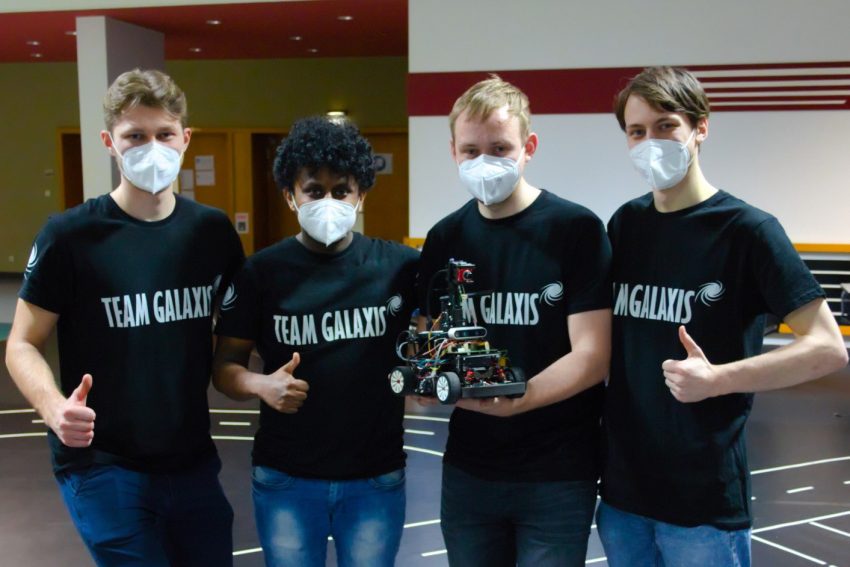Who will win the Carolo Cup@Home? Introducing the teams
The second Carolo@Home Cup has been underway since 14 February. As many as nine teams are sending their automated driving vehicle into the race this year. How have they prepared for the competition? What are the strengths of their vehicle? What challenges did they have to overcome in preparation and in the competition? Here we present the profiles of the teams. The team that has scored the most points in the end will be announced on 17 March at 6 p.m. in the livestream.
The teams of the Carolo Master Cup:
KITcar
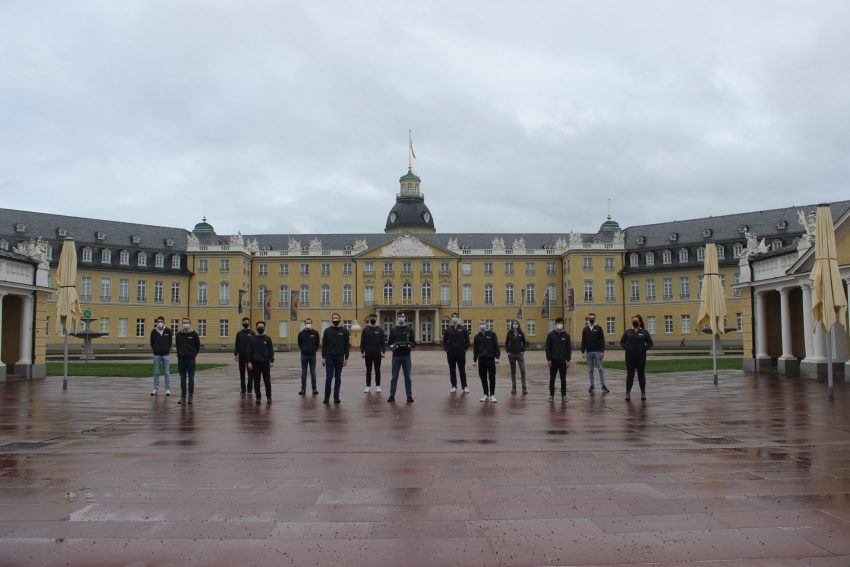
Team KITcar in front of Karlsruhe Castle. Photo credit: Team KITcar/Karlsruher Institut für Technologie
Our team name is KITcar and we come from the Karlsruhe Institute of Technology. Our 35 members study computer science, mechanical engineering, electrical engineering, mechatronics and industrial engineering, among others. This year we are sending our vehicle “Dr. Drift” into the competition. We have participated in the Carolo Cup a total of seven times so far. Of these, we have competed four times in the Carolo Master Cup (2018-2021), once in the Carolo Basic Cup (2017) and twice before there was the split into the Basic and Master Cup (2015-2016).
What particular challenges did you have to face in this year’s participation?
Due to the ongoing Corona pandemic, we worked mainly from home this season. Most of our communication took place online. So team meetings were held via our video conferencing tool and messages outside of meetings went through the messenger Zulip. Our IT department provided the team with a very good infrastructure for this purpose and our simulation team continued to work diligently on the simulation in order to be able to test it quickly and easily from home. During the Cup, most of us still had exams.
How did your preparation go?
Basically, we were able to prepare well for the Carolo Cup over the course of the season, despite working from home. Nevertheless, we were not able to test with Dr. Drift as extensively as usual, which is why we still had to set a few necessary parameters for driving with Dr. Drift as best as possible at the beginning of the Cup. This could not be done from the home office, as our algorithms mainly evaluate and process camera images. Since the lighting conditions on our test track vary throughout the day, the parameters have to be adjusted accordingly. Some changes to the car cannot be validated in the home office, which is why final adjustments to the car were made on site just before the start of the Cup.
What distinguishes your vehicle?
An Intel NUC together with an NVIDIA Jetson forms the high-performance computing unit of our vehicle. With the help of our industrial camera, we receive high-quality images as input. Both axles of the vehicle are steered, which provides greater manoeuvrability and thus allows for quick parking even in narrow parking bays. The accumulators we use have sufficient capacity to allow up to 50 minutes of continuous operation for test purposes. Our self-developed modular electronic system ensures a reliable and effective connection of all sensors and peripherals via CAN bus.
How has the competition gone for you so far?
Due to our well-structured project management, which we have adapted to the new requirements by Corona, we were able to fully solve our tasks despite the exams and the limited time that comes with it. We hope that we were able to present the strengths of our car and our team well. We were also able to highlight the simulation
Team Selfie
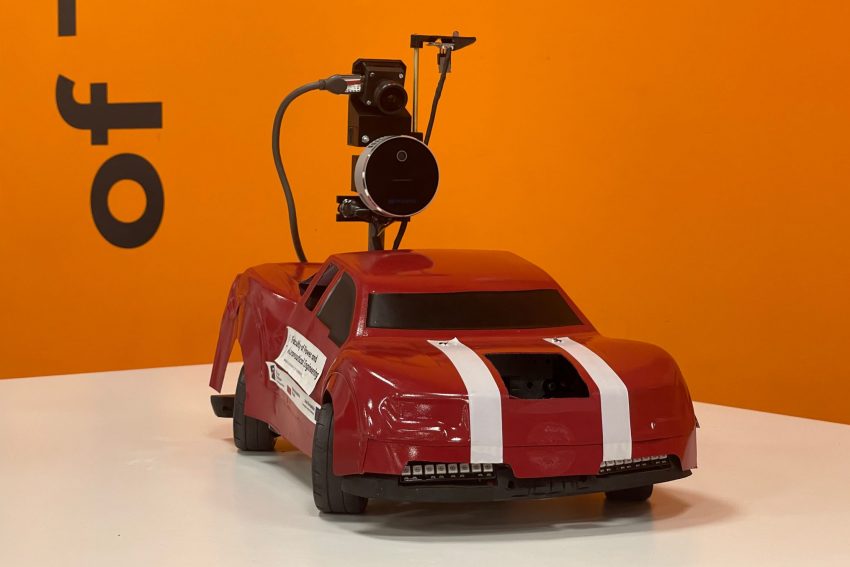
Last year’s winners of the Carolo Basic Cup, Team Selfie is competing in the Carolo Master Cup for the first time. Photo credit: Team Selfie/Warsaw University of Technology
We are Team Selfie from Warsaw University of Technology. This year our team consists of 18 members. Our members come from different fields of study such as mechatronics, robotics or computer science. This year we are participating in the Carolo Master Cup for the first time. Previously, we have taken part in the Carolo-Basic-Cup four times.
What particular challenges did you have to face in this year’s participation?
The biggest challenge in this year’s participation was solving the problem with the manual mode indicator diode.
How was your preparation?
As it is our first participation in the Carolo Master Cup, the preparation was challenging. We had to develop new algorithms so that our car could compete in the Master category.
What distinguishes your car?
This year we replaced Lidar with a depth camera and our car uses two servos that control both axles independently.
How has the competition gone for you so far?
Our biggest achievement in the Carolo Cup is winning the Carolo Basic Cup 2021.
Team Spatzenhirn
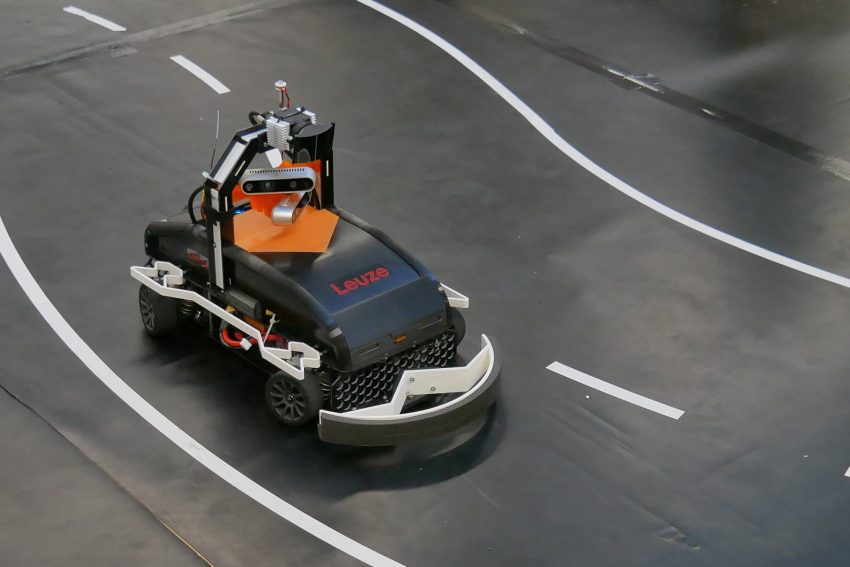
Team Spatzenhirn is sending “Spatz11” into the competition. Photo credit: Team Spatzenhirn/University of Ulm
We are Team Spatzenhirn from the University of Ulm. This year our team consists of 20 students from the study programmes Electrical Engineering, Information Systems Engineering and Computer Science. This time we are competing with our vehicle “Spatz11”. We have participated every year since 2010: until 2017, there was only one form of the Cup. The first time there was a subdivision was in 2017, when we took part in the Carolo-Basic Cup. So in total we have participated in the Master Cup five times (2018-2022), once in the Basic Cup in 2017 and seven times in the single-track version from 2010-2016.
What particular challenges did you have to face in this year’s participation?
This season saw the completion of our new vehicle, the Spatz11. In addition to the change in hardware, we also had to change the software framework from ADTF to ROS2. Of course, this caused a lot of work, but we were able to manage it together as a team.
What distinguishes your vehicle?
The Spatz11 has individual wheel drive and steering as well as a significantly lower centre of gravity compared to its predecessor, the SpatzX. With our new concepts for trajectory planning and control, we make full use of these new degrees of freedom. In terms of sensor technology, our Spatz11 stands out from the other vehicles primarily due to the two depth imaging cameras. These provide a wide field of vision and allow us to detect objects even when they are almost at the same height as the vehicle.
How has the competition gone for you so far?
We are happy with the video recordings, although Spatz11 still offers a lot more potential, which we will elicit from it next season! In particular, we are of course eager to finally see Spatz11 whizzing around the perfectly prepared track in Braunschweig again with even more grip at the Cup 2023. For the Cup@Home 2022, we are still in the process of perfecting the presentation.
The teams of the Carolo Basic Cup:
Team cITIcar
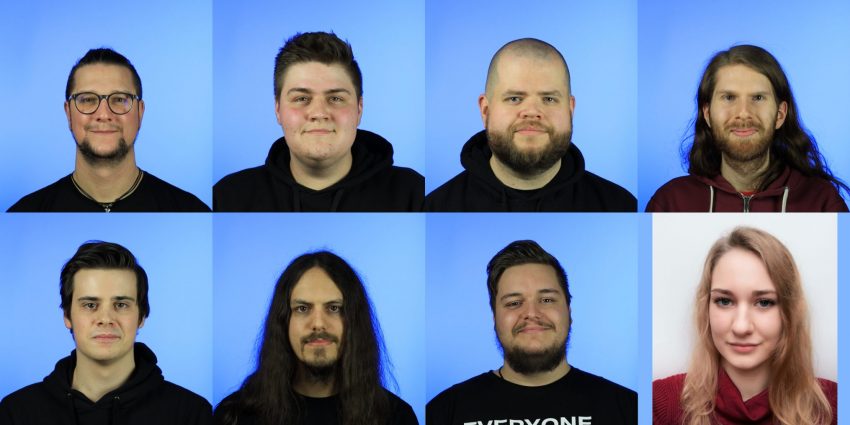
Team cITIcar is taking part in the Carolo Cup for the second time. Photo credit: Team cITIcar/Technische Hochschule Mittelhessen
We are the cITIcar team from Technische Hochschule Mittelhessen. Our team currently consists of nine students from the Computer Science and Computer Engineering courses. Our vehicle is also called “cITIcar”. We also participated in the Carolo Cup in 2020.
What special challenges did you have to face in this year’s participation?
Since we built our vehicle from scratch, there were many small problems and pitfalls that had to be solved. For example, if a part or a bracket didn’t fit, it had to be re-modelled, printed and then tested again. Errors in the hardware also cost a lot of time, because due to the pandemic situation and some other restrictions, it was also not always possible to eliminate these errors immediately. For this reason, the development process was very lengthy. The current delivery times and shortages of various electronic components also caused further delays. Therefore, we only got around to testing the vehicle as a whole very late.
A special challenge was also the restructuring of our hardware. This year, we are using new sensors and a new control board. Of course, this also had an impact on our software, which also had to be restructured. Furthermore, we converted parts of the classic image processing of the vehicle to a neural network.
How did your preparations go?
Our preparations were a bit bumpy and in the end we unfortunately didn’t manage to get our car completely ready to drive. Due to various errors in the communication as well as errors in the software of the sensors and actuators, it is not possible for our vehicle to drive completely autonomously. Since we only came across these errors within the last week, we were unfortunately not able to fix all of them in time. Only the behaviour of the vehicle in the simulation works without any problems.
What distinguishes your vehicle?
This year, our vehicle is characterised by the fact that we have manufactured almost all components ourselves. We built the vehicle from scratch and designed it ourselves. In addition to a specially designed mainboard, we modelled various small parts and brackets ourselves and printed them out with a 3D printer. The only thing we didn’t make ourselves were the vehicle’s tyres.
How has the competition gone for you so far?
In 2020, the competition actually went very well for us. We had a bumpy start at that time, but then we were able to do quite well in the competition. We analysed our mistakes at the time and learned from them, after which we completely redesigned and rebuilt the vehicle.
Team DHBW Smart Rollerz
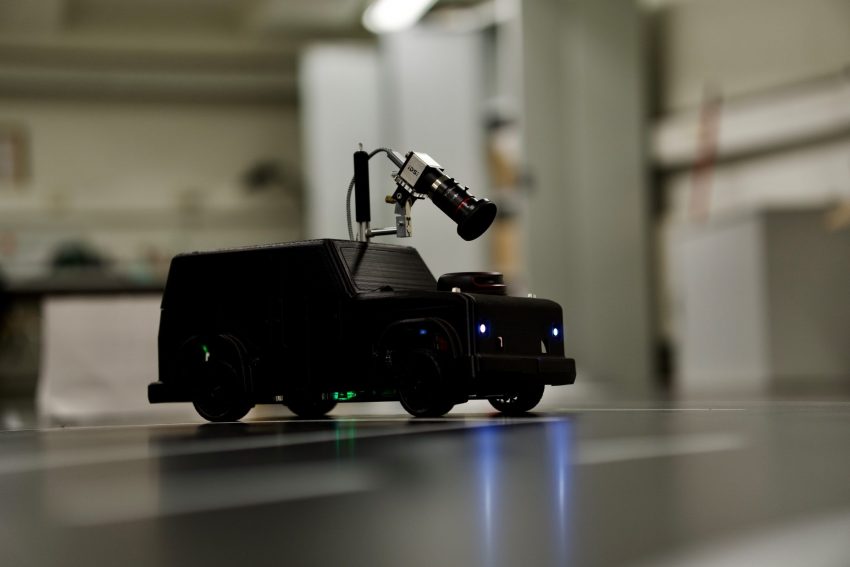
“Smarty” was equipped with improved situational awareness this year. Photo credit: DHBW Smart Rollerz/Duale Hochschule Baden-Württemberg
We are the DHBW Smart Rollerz from the Duale Hochschule Baden-Württemberg and we are taking to the starting line with our vehicle “Smarty”. After 2020 and 2021, we are taking part in the Carolo-Basic-Cup for the third time. This year, 15 team members from the Electrical Engineering, Computer Science and Industrial Engineering courses are working on the project.
What particular challenges did you have to face in this year’s participation?
The technical challenge this year was to develop parking space recognition and an approach to overtaking.
How did your preparation go?
Shortly before the more intensive testing of the newly developed software components on the vehicle, our microcontroller board failed. As a result, we had to invest some “overtime” to replace it as quickly as possible. Unfortunately, this led to a shorter test phase. However, we are happy to have successfully implemented the new key features “overtaking” and “parking”.
What distinguishes your vehicle?
Since this year, the sensor fusion of lidar and camera has enabled us to assess the situation the vehicle is currently in even better and thus plan further driving manoeuvres more effectively.
How has the competition been for you so far?
As always, the dynamics event was very time-consuming.
Team GalaXIs
We are Team GalaXIs from RWTH Aachen University. Our team looks back on a long tradition at the Carolo Cup. In total, the team has already taken part in the competition nine times. We are taking part in the Carolo-Basic-Cup for the third time. This year, four members from the Master’s degree programmes in Computer Science and Data Science worked together on our vehicle “Andromeda”.
What particular challenges did you have to face in this year’s participation?
In terms of direct preparation for the Carolo Cup, the pandemic situation was difficult for us to navigate, as at times only one person was allowed in our team room. This made it much more difficult for us to tune and test the car and the new software.
In terms of team management, we didn’t have much more trouble finding team members during the pandemic, but we had more trouble training and retaining them. For a small team like ours, the individual motivation of each member is critical, as well as the feeling of being able to make a difference to the vehicle. Both are more difficult to convey via Zoom than in direct personal contact on site.
How did your preparation go?
Overall, our preparation went well and without any major problems. For us, the preparation consisted of the final tuning of the vehicle and fixing some bugs with the lighting of the vehicle and the correct behaviour when switching from autonomous to manual control, because we operate the vehicle without a body in test mode. In preparation for the video, we had watched the videos of the CaroloCups@Home from 2021, thought about some scenes, prepared our debug view (which we show during obstacle driving) and did some tests on recording and video editing.
What distinguishes your vehicle?
Functionality/function over form. It’s definitely not the prettiest vehicle and probably not the best technically, but it’s very functional and does its job.
Team it:movES
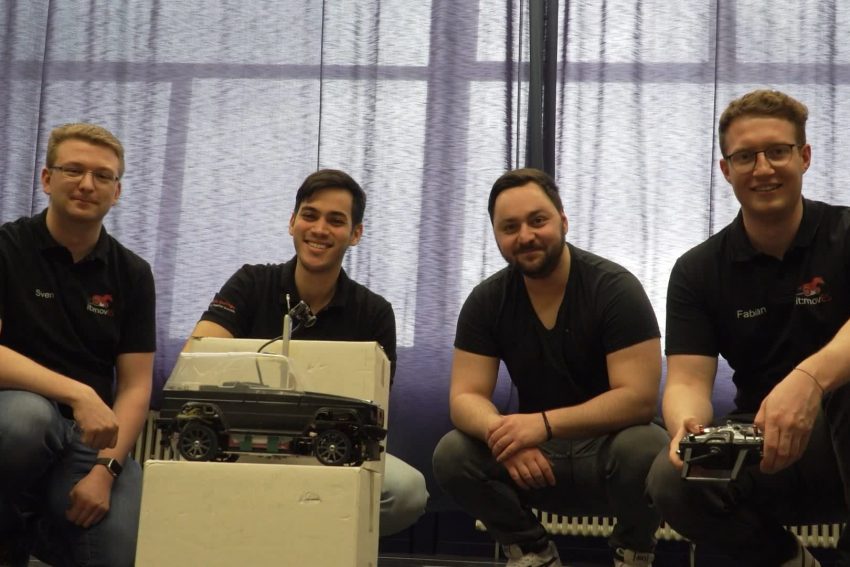
Team it:movES with “G Wagon” (Created with 2G+ in mind). Photo credit: Team it:movES/University of Applied Sciences Esslingen
We are the Team it:movES from Hochschule Esslingen. Our four team members are all studying Computer Science in the Master’s programme. Our vehicle is called “G Wagon”. We have participated in the Carolo-Basic-Cup six times before.
What particular challenges did you have to face in this year’s participation?
The biggest challenge for participating this year was the implementation of the completely new hardware/platform with a greatly reduced team. We were also able to cope well with the reduced attendance time due to Corona with the help of our new simulation.
How did your preparation go?
Traditionally turbulent, but satisfactory within the limits of our possibilities. Both hardware and software problems regularly presented us with new puzzles, so that it was not certain at all times whether participation in the Cup would be possible at all. All in all, however, after long days and nights we were able to solve all the problems and fulfil the required features of the Basic Cup right on time for the start of the Cup.
What distinguishes your vehicle?
The highlight of our new generation is the updated, more powerful hardware, which is the platform for future features, such as the integration of a radar. In addition to new actuators and sensors, our vehicle was equipped with an NVIDIA Jetson AGX Xavier in order to be able to process the sensor information in real time in the best possible way. With the increased computing power, we will also be able to integrate AI-supported components in the future.
How has the competition gone for you so far?
By optimising numerous controller parameters, we were able to get the (current) maximum out of our car in terms of driving speed, and avoiding obstacles also worked well, as expected, so we are happy with the result in the form of the video. Of course, we are curious to see how the competition has performed this year.
Team Ostfalia-Cup
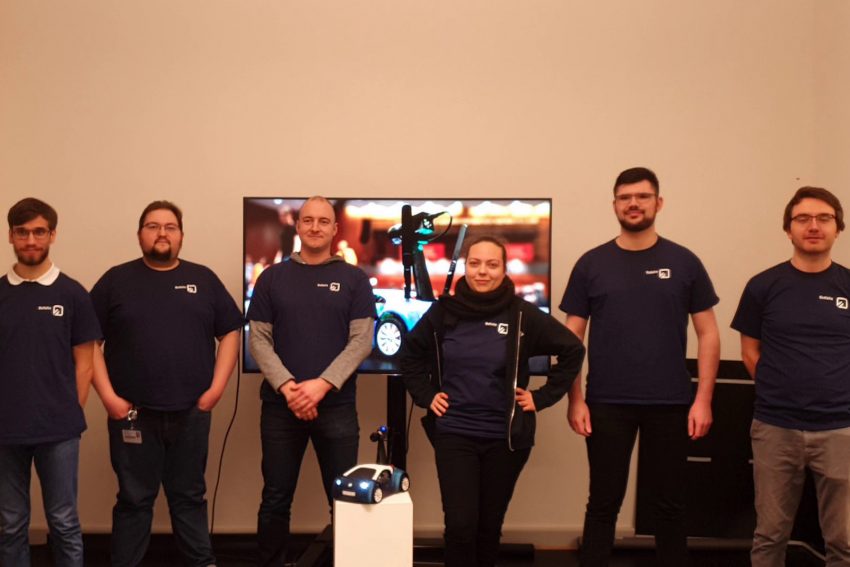
Team Ostfalia-Cup – f.l.t.r.: Felix Schmidt, Lars Kelm, Bastian Teßin, Vanessa Niemitz, Lukas Klose, Daniel Lux (The group photo was taken under 2G conditions.) Photo credit: Team Ostfalia-Cup/Ostfalia – University of Applied Sciences
Hello! We are the Ostfalia Cup team from the Ostfalia – University of Applied Sciences. Currently our team consists of six members and two coaches. At the moment we are all Computer Scientists, but we would be happy to have support from other faculties at any time. This year, we entered the competition with the “CUP” vehicle. We named it after the double meaning of the word “cup” (“trophy” or “mug”) and after other associations with the word “mug”. The Ostfalia Cup team is one of the oldest teams among the participants. Ostfalia Cup is taking part in the event for the eleventh time this year. So far, the team has always taken part in the Carolo Cup (old name) and the Carolo Master Cup – with the exception of 2018 and 2021. This year is the first year that the team has decided that after a break of almost two years, it would make more sense to reboot by participating in the Carolo Basic Cup.
What particular challenges did you have to face in this year’s participation?
First of all, we had to take into account the Corona situation and the requirements of the state of Lower Saxony and wait until our dean gave us permission to work as a club at the university again.
Furthermore, there were some changes in the team members, such as two (current) members are now fully employed and another member has been a father of a family for several years, but due to Corona, the availability of childcare is limited. So there is not as much available and shared time to work together as there used to be.
Last but not least, we have only been able to recruit one new member in recent times, as we have only been able to advertise online at the university, if at all. Also, due to “home studying”, many students have not even moved to campus and cannot participate because the journey is too long and digital participation is too boring for them.
How did your preparation go?
In the past, our workflow was particularly problematic, as many things were discussed at our meetings without any structure. Since the change with a tight topic system and the limitation to a maximum of one hour-long meeting per week, the efficiency has increased significantly.
Another point is the “working hour”, which previously had no fixed time, but rather took place spontaneously over the weekend. Now there is a fixed time during the week when at least one person is on site and works on the car. This makes a continuous workflow more visible and ensures more motivation in the team.
During the work stoppage, the work shifted more to the home office and many issues in the software were tackled that were long overdue. Unfortunately, our self-written simulation is still too far removed from the real world, which results in algorithms working perfectly in the simulation but still causing problems on the real car.
We have also used the time since the pandemic to revise our previous management solutions. This culminated in a complete re-implementation of our server systems, with a new website, new services, etc. We are now managing most things in the new system. Now we manage most things in the team via a Gitlab/Nextcloud instance and use corresponding web servers that provide the website on the one hand and the documentation on the other.
What distinguishes your vehicle?
Our vehicles are almost completely self-developed. The hardware platform was completely designed by us. This enables us to manufacture most of the components ourselves using the 3D layer printing process or have them manufactured according to our models.
The electronic boards are also self-designed (with the exception of the NVIDIA Tegra TX2 and its carrier board) and allow us to fit a lot of technology into the small space. The communication between the individual boards works like the distributed system in a real car on the basis of the CAN bus – of course our bus system is less complex.
The software is now almost entirely self-written, which gives us the advantage of being dependent on very little third-party software (Linux OS, DL Framework, drivers for the camera) and allows us to utilise our computer much more efficiently – this results in a longer battery life and a lower weight.
Thanks to our lightweight construction and the efficiently used computer hardware, we were awarded the VDI special prize “Lightest Vehicle” in 2020 together with the University of Osnabrück.
How has the competition gone for you so far?
Average, I guess you could say. On the one hand, we are happy that we can finally work on our hobby again. And for some of us it was very intense and very rewarding to work in a place other than the home office after a good two years. We all really enjoyed working as a real team on location.
On the other hand, the atmosphere of the “original” Carolo Cup is still missing. This is more than just a small event in the Stadthalle. It is THE FINALE of a season. Everyone is then highly concentrated and completely suffering from excitement and lack of sleep, and yet it’s a lot of fun every time. It’s different in your own rooms. The deadline is also breathing down your neck, but it is not comparable to the “stage fright” at the “original” Carolo Cup.
Team ottoCar
We are the team oTToCar and come from the Otto-von-Guericke-University Magdeburg. Our seven team members are all studying in a computer science-focused degree programme. This year we are sending our vehicle “Luci” out on the course, with our team having participated in the Carolo-Basic-Cup since 2014. So all in all, this is our ninth participation.
What particular challenges did you have to face in this year’s participation?
Our completely redesigned car still needed a lot of work in the control system, which made the preparation of the high-level software come up a bit short.
How did your preparation go?
Many integration weekends got the new car into a good, ready-to-drive condition. Unfortunately, not all members were always available, as at our university the Cup falls exactly in the exam month.
What distinguishes your car?
We have a lot of self-build components that can be made with standard workshop equipment. In the past we relied on 1/10th scale prefabricated kits, but the amount of compromises we had to make was a bit frustrating.
The latest generation car has allowed us to incorporate double steering and single wheel drive, which allows for very tight cornering and better traction.
How has the competition been for you so far?
A bit more relaxed than the last ones.
The two teams from TU Braunschweig, Team CDLC and the ISF Lions, did not take part in the competition this year for internal team reasons.

